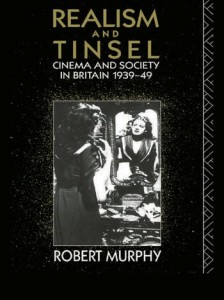Realism and Tinsel
Cinema and Society in Britain 1939-48


Average rating: ![]()
| 0 | rating | |
| 0 | rating | |
| 0 | rating | |
| 0 | rating |
Your rating: -
Book Presentation:
With themes ranging from passion and romance to murder and psychological disturbance, popular British film in the 1940s found little favour with the critics, but provided thrills and entertainment for millions of people during a time of austerity and danger. Realism and Tinsel looks beyond the established histories of Ealing Comedies and realist classics to excavate a rich but neglected tradition of melodrama, gangster films, morbid thrillers, and costume pictures. Discussing cinema in the context of the major social, economic, and political changes that were taking place, Robert Murphy examines the period's most popular films, including Madonna of the Seven Moons, The Way Ahead, and The Wicked Lady. The picture that emerges challenges the reassuring, cosy view of Britain presented in realist cinema, and throws new light on the British film industry of the time, and on our idea of the war era itself.
Press Reviews:
`Pursuing his theory in lively style and with examination of a large number of productions, the author has written an unfailingly interesting study, fully documented and concluding with a useful chronology of cinema society through the period.' - Film Review
`Robert Murphy ... has broken new ground, not only in covering the British cinema in the forties as a whole, but in looking beyond the critical orthodoxy ...' - Eric Braun, The Stage and Television Today
`...very well documented, gracefully written, and convincingly argued.' - Choice
`...[a] welcome addition to the impressive `Cinema and Society' series...' - History Today
Sight and Sound praised: `... the readiness, indeed eagerness, of Murphy's study to browse along not just the main thoroughfare of 1940s British Cinema ... but also an assortment of back streets: By-Ways for variety and radio stars.'
`Pursuing his theory in lively style and with examination of a large number of productions, the author has written an unfailingly interesting study, fully documented and concluding with a useful chronology of cinema society through the period.' - Film Review
`... elegant and clearly written ...' - Michael Paris, History Today
`Robert Murphy ... has broken new ground, not only in covering the British cinema in the forties as a whole, but in looking beyond the critical orthodoxy ...' - Eric Braun, The Stage and Television Today
`... solidly researched ... a detailed and straightforward account of the hundreds of British films turned out during the period ...' - J.K.L. Walker, Times Literary Supplement
See the publisher website: Routledge
> From the same author:
> On a related topic:
The British Trauma Film (2024)
Psychoanalysis and Popular British Cinema in the Immediate Aftermath of the Second World War
by Adam Plummer
Subject: Countries > Great Britain
Projecting Britain at War (2014)
The National Character in British World War II Films
Subject: Countries > Great Britain
Destination London (2012)
German-Speaking Emigrés and British Cinema, 1925-1950
Dir. Tim Bergfelder and Christian Cargnelli
Subject: Countries > Great Britain
Cinema Memories (2023)
A People's History of Cinema-going in 1960s Britain
by Melvyn Stokes, Matthew Jones and Emma Pett
Subject: Countries > Great Britain
The Metropolitan Police and the British Film Industry, 1919-1956 (2023)
Public Relations, Collaboration and Control
by Alex Rock
Subject: Countries > Great Britain